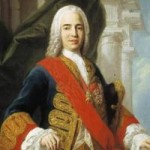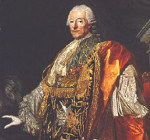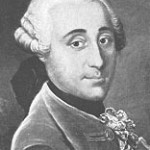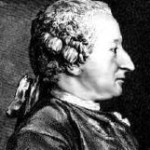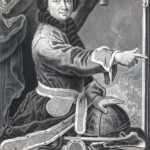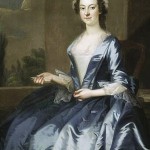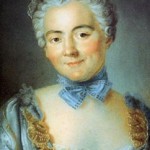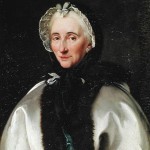Casting Notes & Excerpts from Urania the Play are intended to give the reader an idea of the dialogue style and humor of the play itself. Listed below is the title of the role or roles, a brief description followed by the casting notes for the character. Read Excerpts
Cast / Dramatis Personae

Gabrielle Émilie Le Tonnelier de Breteuil, marquise du Châtelet (17 December 1706 – 10 September 1749)
Gabrielle Emilie le Tonnelier de Breteuil, Marquise Du Châtelet
Emilie du Chatelet rebelled against the constraints of the 18th century in her self created academy at Cirey with her lover Voltaire. Constantly in the tabloids for their scandalous relationship, she managed to still publish works on physics, mathematics and even the subject of happiness.
Emilie is a honest person, she wears her heart on her sleeve, yet thoroughly grasps the necessary maneuverings of courtly life. Her servants are not her friends, but she is not unkind. She is fashionable and brilliant and aware and yet deeply emotionally vulnerable and cannot live without love. She is also multi talented with an operatic singing capability. She didn’t mind the spot light, but did not crave it. Could also be absent minded because she was so absorbed in her work and after awhile she was indulged with this absent mindedness at Versailles and at Lorraine due to her publications. Yet, if in the case of Graffigny, she felt her whole happiness was threatened and she would react angrily. Also, she was deeply loved by 3 men, such affection is not due to a forced flirtatious personality, her heart is kind and her words genuine.
Voltaire, lover and companion of Emilie
Voltaire is France’s greatest poet and not only inspires Emilie’s love but her intellect. Their meeting of the minds is often interrupted by the King and his threats to arrest Voltaire for his inflammatory verses that deliver insightful critiques on society and its’ foibles.
Voltaire, lover and companion of Emilie, very intelligent, quick witted, amusing always a retort, fearless, not in a stupid way rather he loved pushing boundaries, rumors he had homosexual tendencies, this is a man of abundant confidence, he doesn’t really have an arc bc his ego is so energizing and constant, he loved Emilie and even though in part he betrayed her memory many years after her death, he recognized her for all her qualities whether or not if at all times his ego could handle it, but the stomach issues reveal some of the inner neurosis.
Florent-Claude, Marquis Du Châtelet-Lomont, husband of Emilie Du Châtelet
Emilie’s husband Florent-Claude, Marquis Du Châtelet-Lomont, allows her the freedom to study mathematics while he remains at France’s battle front. His reliable nature and man in uniform appeal have withstood the test of Emilie’s studies.
Florent-Claude is a military man, he eventually became the equivalent of a 5 star general, aware without acting aware, many think he’s dumb or slow, it is the age of letters, salons where quick wit is continuously demonstrated can all to often mean scathing commentaries, for someone who does not think quickly on his feet, a reputation for stupidity would be guaranteed, however he had a distinguished military career, supported her and was kind and was completely devastated by her death. I decided to read between the lines of how much he must have loved Emilie to allow her such freedoms.
Louis Francois Armand Du Plessis, Duc de Richelieu, friend of Emilie Du Châtelet & Florent Claude
Duc de Richelieu, is a great friend of Emilie and Florent Claude and in Voltaire’s pocket financially. His close friendship to the King of France means his pocket book is often empty and Voltaire, though a writer, is quite rich and lends easily.
Duc de Richelieu has rakish charm but deeply admires Emilie and tolerates Voltaire due to his money. His young wife prior to her sudden death was Emilie’s friend and adored by the Duc. So mostly we see the rake, but he had sensitivities and was also a friend of Florent Claude’s and helped orchestrate the uneasy household of Emilie and Voltaire.
Same Actor
Pierre Robert Le Cornier de Cideville, friend of Voltaire
Jean-Francois de Saint-Lambert, lover of Emilie Du Châtelet
In the dual roles of Cideville, friend of Voltaire and Saint-Lambert, lover of Emilie transforms from sarcasm to sweetness in a few pages. This delicate transformation elicits sighs of pleasure from the audience and Emilie.
Pierre Robert Le Cornier de Cideville, friend of Voltaire, deeply sarcastic, snobbish, smart. He and Voltaire were schoolmates and remained friends their entire lives. Voltaire trusts him.
Jean-Francois de Saint-Lambert, lover of Emilie Du Châtelet sweet and gentle but not complete pushover. His arc occurs mainly after her death, there is a hidden depth to Lambert, who suffered a complete break down when she died. A soldier used to courtly games, his affair with Emilie and love caused him to leave the shallow games of changing lovers and favorites behind. He sees Emilie but does not have the massive insight Voltaire possesses from all their years together, in a way he is innocent.
Same Actor
Alexis Claude de Clairaut, friend, mathematician and tutor to Emilie Du Châtelet
Gossips: Man
In the dual roles of Monsieur Clairaut, dear friend and mathematics tutor to Emilie and Gossip Man, Clairaut is continuously snubbed by Voltaire for his platonic dedication to Emilie and mastery of mathematics. But as Gossip Man his sardonic eyebrow is continuously raised to deliver a judgment on men, women and science and a few things in between.
Alexis Claude de Clairaut, friend, mathematician and tutor to Emilie Du Châtelet, sweet, deeply fond of Emilie and brilliant, a prodigy and was a first hand witness to the arc of Emilie’s mathematical prowess. He accompanied Maupertuis on the Lapland expedition and never married.
Same Actor
Pierre-Louis Moreau de Maupertuis, explorer, tutor and mathematician to Emilie Du Châtelet
Sébastian Longchamps, servant of Voltaire and lover of Thérèse
In the dual roles of Sébastian Longchamps, servant of Voltaire and lover of Thérèse and Pierre-Louis Moreau de Maupertuis, explorer and mathematics tutor to Emilie Du Châtelet, glides easily between intellectual bouts with Voltaire and seduction scenes with Therese.
Pierre-Louis Moreau de Maupertuis, explorer, ladies man, brilliant tutor and mathematician to Emilie Du Châtelet, confident in control, lightly sarcastic with a sometimes explosive temper, his journey to Lapland to measure the meridians proved Newton’s mechanics vs Cartesian in the 1730s, he arrived back to Paris feted by society with 2 pretty lapland ladies in tow. I wrote him in as helping compose the opera for the King’s son, he’s one of the only characters given retorts equal to Voltaire. Both had titanic egos.
Sébastian Longchamps, servant of Voltaire and lover of Thérèse, dislikes Emilie, prefers wooing women he can control, sarcastic, bit bitter, he wrote his memoires of his time with Voltaire and Emilie specifically the bath water scene can be attributed to him and he was present at her death.
Marguerite-Thérèse Colbert de Croisey, friend of Emilie Du Châtelet
Maguerite, Emilie’s dearest friend and confidant, always has a quick reply and an eye for all things male. Her insightful witticisms into love and life are words to live by.
Maguerite was once a highly sought after society damsel now a bit past her prime, but well versed in the ways of men and women and the court of Versailles, cunning in a kind way and deeply loyal to Emilie. This character is in some ways a composite character of Emilie’s closest female friends combined into one role.
Same Actor
Marie-Louise Denis, Voltaire’s niece
Thérèse, servant of Emilie Du Châtelet
Gossips: Lady 2
The multiple roles of Therese – lover of Longchamps, Gossip Lady 2 and Madame Denis, allows a change between characters with aplomb and a demure sauciness. Her loyalty to Emilie is never superseded by Longchamps as she ofts each of his slights with knowingly sweet innocence.
Marie-Louise Denis, Voltaire’s niece, charming, young widow, not super sophisticated at this time, but after Emilie’s death they did spend the rest of their lives together and she wrote plays and held salons. Her eyes were crooked and Voltaire really liked the shape of her butt. She was not stupid but in no way shape or form, brilliant.
Thérèse, servant of Emilie Du Châtelet, knows her place as servant but loyal to Emilie and obedient, easy to manipulate but if she senses something is wrong she refrains. A genuinely good character and a complete fabrication.
Gossips: Lady 1, a lessor nobility with eyes narrowed and jealous, very self righteous
Same Actor
Gossips: Lady 1
Françoise De Graffigny, widow and guest of Emilie Du Châtelet
In the dual roles of Madame Graffigny, the sly widow house guest of Emilie and Voltaire and Gossip Lady 1, she flounces her fan and her sharp tongue. Her indiscreet letters nearly get Voltaire arrested, while her sarcasm reigns supreme as a Parisian gossip.
Françoise De Graffigny, widow and guest of Emilie Du Châtelet, a very smart woman with a prodigious memory and held her own salons long after Emilie’s death. She survived a brutal husband and the loss of her fortune, some of her survival is due to carefully planned moves and an ingratiating attitude. The episode of the letter is very famous and caused her to hate Emilie.
Gossips: Lady 1, a lessor nobility with eyes narrowed and jealous, very self righteous.


